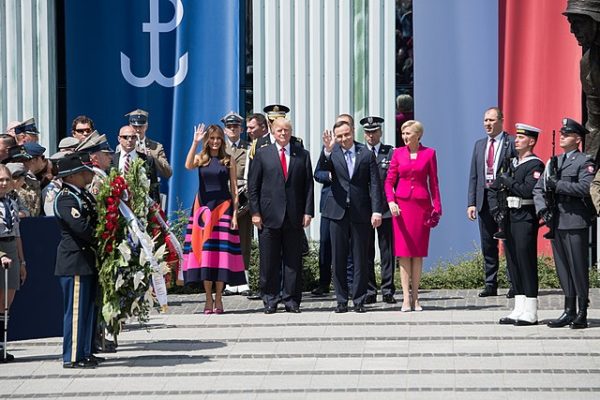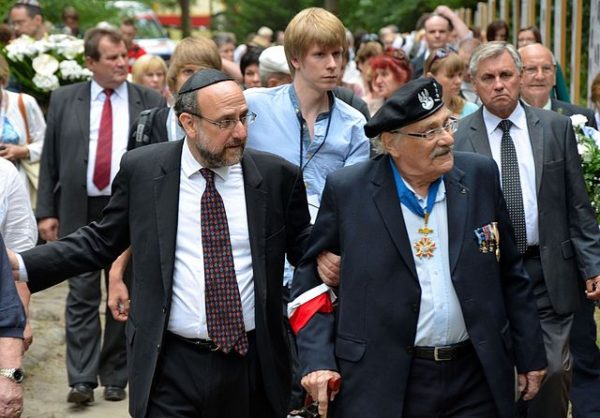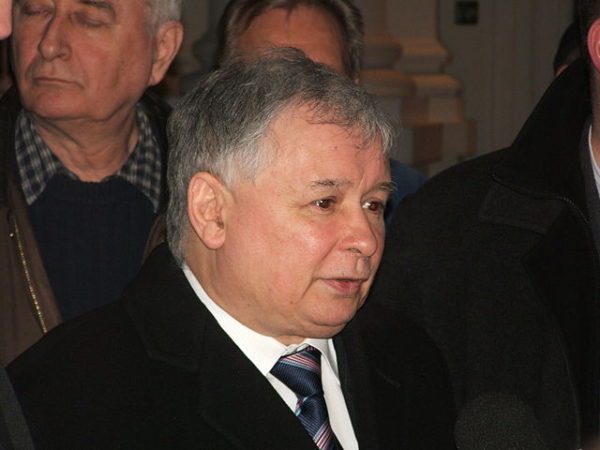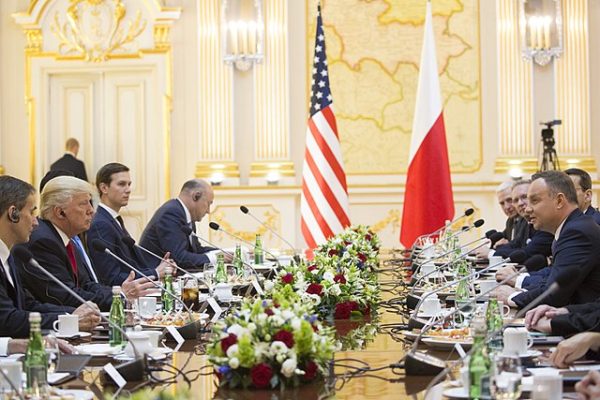U.S. President Donald Trump visited Poland on July 5-6, stressing the country’s importance as a loyal NATO ally. “Poland will always prevail,” he said, praising the courage and spirit of the Polish people in a major speech at Warsaw’s Krasinski Square.

The backdrop to his address was the memorial to the Warsaw Uprising of 1944 against Nazi Germany. It resulted in more than 200,000 Polish deaths and the destruction of much of the city.
Jewish leaders in Poland criticized Trump for not including a stop at the Warsaw Ghetto Uprising monument, which commemorates the Jewish partisans who rose up against the Germans in a doomed uprising in 1943.
The rebuke came in a joint statement from Poland’s chief rabbi, Michael Schudrich; Anna Chipczynska, president of the Jewish Community of Warsaw, and Leslaw Piszewski, president of the Union of Jewish Communities of Poland.

They called the absence of a presidential visit to the Monument to the Heroes of the Warsaw Ghetto a “slight.”
As a last minute change in her itinerary, Trump’s daughter, Ivanka, laid a wreath at the memorial. She also visited the new Polin Museum of the History of Polish Jews.
“It was a privilege to pay my respects and remember, with gratitude, those who tenaciously fought against all odds,” she said in a statement. “The monument, erected on the rubble of the Warsaw Ghetto, symbolizes the fight for freedom. I am profoundly grateful for those who fought and all those who continue to fight today.”
A U.S. ally in Iraq and Afghanistan, Poland is among the five NATO members that spend at least two percent of their gross domestic product on the military. It also hosts American troops and is acquiring a new American Patriot missile system for its defense.
After all, it still shares a small border in the northeast with its historic enemy, Russia.
The country is doing very well. With a population of nearly 40 million, Poland’s half-trillion-dollar economy is already the world’s 24th largest. Exports continue to boom and the trade balance is in surplus.
Poland has been ruled since October 2015 by the Law and Justice Party (Prawo i Sprawiedliwosc, or PiS). It won 37.6 percent of the vote in elections to the Sejm, the lower house of parliament, good for 235 of its 460 seats.

Jaroslaw and Lech Kaczynski, twin brothers, founded the party in 2001. Lech died in a plane crash in Russia in 2010, while president of the country.
Jaroslaw is currently the party’s chair, though not formally part of the government. He served for a little over a year as prime minister in 2006-2007 during his brother’s presidency.
The right-wing PiS pursues a nationalist agenda and is more skeptical than its liberal Civic Platform predecessor about the EU, which Poland joined in 2004.
Poland is a classical nation state. Almost 97 percent of its 38.6 million people are ethnic Polish-speaking Catholics, and they want to keep it that way. Their policy on immigration is far more stringent than even that of Trump.
The European Commission, the executive arm of the EU, on June 13 initiated legal action against Poland for failing to comply with an order to take in thousands of migrants from Africa, Asia and the Middle East.
The dispute dates back to September 2015, when, at the height of Europe’s migration crisis, EU member states voted to relocate 160,000 refugees already in Italy and Greece to other parts of the bloc.
Nine countries in Central and Eastern Europe were ordered to take in around 15,000 migrants. But several refused. Poland was given a quota of 6,182 migrants, not one of whom has been admitted.
Opposition to the EU demand was one of the issues the PiS campaigned on during the October 2015 electoral campaign.
Poland’s PiS prime minister, Beata Szydlo, recently declared that her country would not be “blackmailed” by EU officials.
“We are not going to take part in the madness of the Brussels elite,” she told parliament on May 24. “If you cannot see that terrorism currently has the potential to hurt every country in Europe, and you think that Poland should not defend itself, you are going hand in hand with those who point this weapon against Europe, against all of us.”
A few days earlier, Jaroslaw Kaczynski blamed German Chancellor Angela Merkel for causing the bloc’s migration problems, and insisted that Germany bear the consequences, not Poland.

President Andrzej Duda, who is now officially an independent, but came up through the rank of the PiS, said on June 8 that he supports holding a referendum asking Poles if they want to accept refugees, but not until 2019, and only if migration is still a “problem” then.
The current Polish government doesn’t agree “with a mandatory redistribution of refugees to Poland,” he told reporters.
The public certainly supports this position. Some 70 percent want to stop all migration from Muslim countries. Forty percent say they would prefer financial penalties to accepting the refugee quota.
The quarrel allows the Polish government to further its narrative that this is part of a broader effort by the EU to impinge on Poland’s “sovereign right to control its own borders, cultural identity and security,” argues Daniel Tilles, an assistant professor of history at the Pedagogical University of Krakow. It hurts the EU “for no benefit whatsoever.”
While in Warsaw, Trump also met leaders of the 11 other European Union member countries attending the Three Seas Conference.
Convened by Poland and Croatia, the initiative includes EU countries situated between the Baltic, Adriatic and Black Seas and is intended to serve as a counterweight to Franco-German dominance in European politics.
Henry Srebrnik, a Polish citizen, is a professor of political science at the University of Prince Edward Island.
